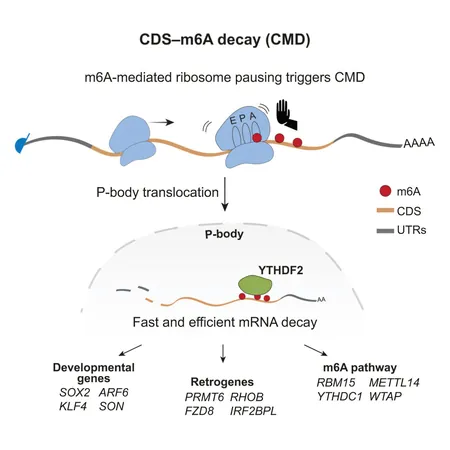
Breakthrough Discovery in mRNA Degradation: A Game-Changer for Cancer Treatments?
2024-12-16
Author: William
Introduction
Researchers at the University of Würzburg have made an exciting breakthrough in understanding how mRNA molecules are broken down in the human body. This groundbreaking discovery could pave the way for novel clinical treatments, particularly in the realm of cancer therapy. The findings were published in the esteemed journal *Molecular Cell*.
The Role of mRNA
mRNA, or messenger ribonucleic acid, plays a crucial role in our biology. These molecules act as blueprints for protein synthesis, essential for maintaining life functions such as cell division, immune responses, and cellular integrity against external threats. However, just like construction projects require specific guidelines for execution, biological processes also depend on nuanced regulatory mechanisms.
The Importance of m6A Modification
In this study, researchers focused on the N6-methyladenosine (m6A) modification of mRNA. This intriguing modification is often found to be altered in individuals suffering from various health issues, including metabolic disorders and cancers. According to bioinformatician Kathi Zarnack, when m6A is present on an mRNA, it instigates the degradation of that mRNA once the corresponding proteins have been synthesized. This is a vital protection mechanism preventing the overproduction of specific proteins—an overload can be detrimental to cellular health.
The Novel Degradation Pathway
The research team has notably identified a novel degradation pathway that links the breakdown of mRNA directly to the synthesis of proteins, offering a more rapid and efficient means of regulating protein levels compared to previously known methods. However, this mechanism operates only when m6A is situated in specific areas of the mRNA, signaling that the degradation process is selective, particularly affecting proteins that dictate cell fate and differentiation.
Implications for Cancer Treatment
The implications of this discovery are significant. By developing drugs that can manipulate m6A modifications on mRNA, scientists could theoretically increase the production of beneficial proteins while curbing unwanted or harmful protein synthesis. This targeted approach represents a promising avenue for therapeutic intervention in various diseases, especially cancer.
Overcoming Previous Challenges
One of the challenges that researchers faced before this study was the inability to accurately predict the impacts of m6A-related drugs due to a lack of understanding regarding the specific regions of mRNA where modifications would lead to degradation. However, with the insights gained from this research, the team is now positioned to improve drug effectiveness by predicting which mRNAs are most susceptible to these therapeutic agents.
Future Research Directions
Moving forward, the University of Würzburg researchers are committed to exploring the precise mechanisms behind m6A-marked mRNA degradation. Their next steps will involve determining how ribosomes detect this modification and leveraging targeted mRNA degradation in clinical settings.
Conclusion
This discovery not only enhances our understanding of mRNA dynamics but could also revolutionize treatment approaches for conditions like cancer—ushering in a new era of precision medicine. Will this study be the key to unlocking the future of therapeutic interventions? Only time will tell!









 Brasil (PT)
Brasil (PT)
 Canada (EN)
Canada (EN)
 Chile (ES)
Chile (ES)
 España (ES)
España (ES)
 France (FR)
France (FR)
 Hong Kong (EN)
Hong Kong (EN)
 Italia (IT)
Italia (IT)
 日本 (JA)
日本 (JA)
 Magyarország (HU)
Magyarország (HU)
 Norge (NO)
Norge (NO)
 Polska (PL)
Polska (PL)
 Schweiz (DE)
Schweiz (DE)
 Singapore (EN)
Singapore (EN)
 Sverige (SV)
Sverige (SV)
 Suomi (FI)
Suomi (FI)
 Türkiye (TR)
Türkiye (TR)